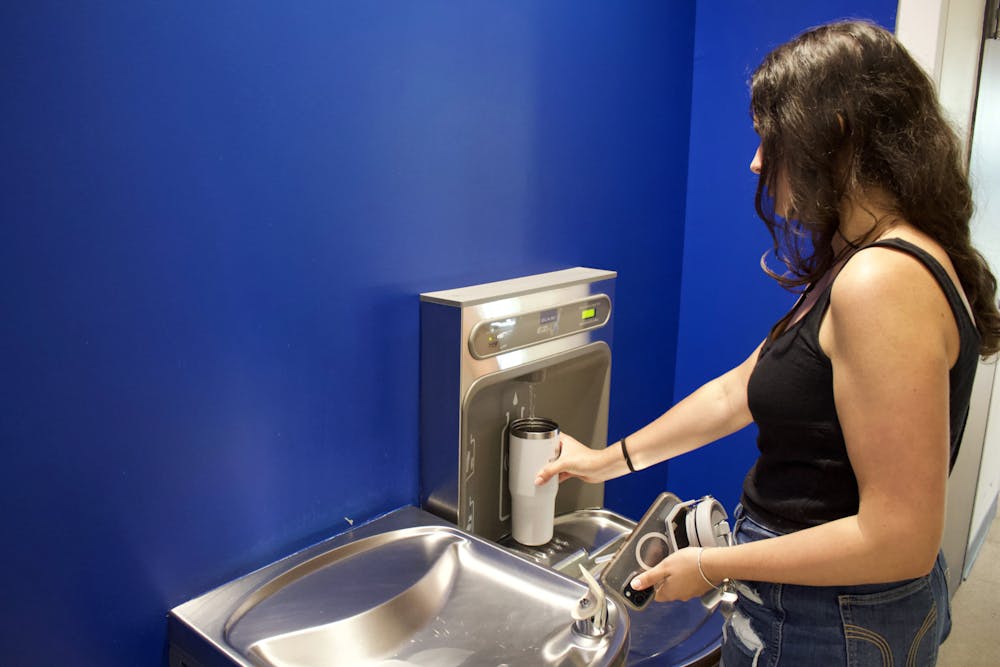One day while working, Henry Rodriguez came across a bag of reusable water bottles from the lost and found, all headed for the trash.
Instead of letting them go to waste, the 54-year-old maintenance generalist at University of Florida’s Southwest Recreation Center took them home. Rodriguez gave the bottles to a friend from the Philippines, who mailed them to her family overseas.
His new routine consisted of picking up the recreation center’s forgotten bottles. With his neighbor’s help, Rodriguez distributes the bottles to homeless people in Gainesville. The goal is to keep plastic bottles from littering the streets while helping those in need, he said.
“I feel like I’m doing something good by that,” Rodriguez said.
Finding his own way to be more sustainable is a source of pride for Rodriguez.
Water refill stations dot nearly every building at UF as an understated form of sustainable infrastructure. As lawmakers scrub mentions of “climate change” across the state, small-scale initiatives help reduce waste one bottle at a time.
In May 2024, Gov. Ron DeSantis signed HB 1645 into law. The bill removes nearly all references to “climate change” from Florida statutes. By replacing this language, state laws shift away from preventing a climate crisis.
On UF’s campus, students and staff participate in a small but meaningful act that helps combat the impact of state policies that minimize environmental concerns by choosing reusable bottles.
They sip from Hydro Flasks, Stanleys, Owalas and other brands, many of which are plastered with stickers, wrapped in sleeves or personalized in other ways.
Now, the environmentally conscious choice has become a full-blown campus accessory.
The university takes its own steps toward sustainability with sensor-activated dispensers. The Reitz Union, a hotspot for student activity, has more than a dozen refill stations across the building’s eight levels. Maintenance workers across campus change the filters on the refill stations every six months.
For some, refill stations and reusable water bottles encourage more sustainable practices that reduce plastic waste. For others, it’s more about the aesthetic.
Joanna Priovolos, a 21-year-old UF business senior, prioritizes practicality over keeping up with the latest trends. Owning one or two water bottles is enough, and any more would be a waste, she said.
“People buy the new trend,” Priovolos said. “And it becomes too much.”
She’s seen influencers flock to Instagram and TikTok to show off their new bottles.
The impulse to collect, replace or upgrade is a choice shaped by consumer psychology. It allows consumers to blend personal style and usefulness while staying on trend.
Aner Sela, a UF marketing professor, specializes in understanding how consumers make choices and form preferences. Consumers often choose products that are easy to justify buying, he said. They often underestimate the effect other people have on their choices.
“People look to other people to see what’s the norm,” Sela said.
Frequent exposure to refill stations, ice machines and people using reusable bottles reinforces the behavior and promotes consistent use, he said.
“There’s not only verbal word of mouth, there’s also visual word of mouth,” he said. “We’re influenced by what we see around us.”
The cycle of consumption, driven by aesthetics and social influence, often overshadows the sustainable objective of the reusable water bottles. However, using campus resources can help reduce waste.
The university has nearly three dozen clubs dedicated to promoting sustainable practices. While the environmental impact of a reusable bottle may seem small, studies show that reusing and redistributing them can significantly reduce plastic waste over time.
Students looking to make a difference can start with small, consistent choices. Use and refill reusable water bottles in libraries, residence halls, dining areas and academic buildings. Most stations can be found near restrooms.
For those looking to do even more, there are student organizations like Gators Going Green or UF’s Office of Sustainability that offer programs and volunteer opportunities focused on campus sustainability.
Contact Isis Snow at isnow@alligator.org. Follow her on X @snow_isisUF.

Isis is a senior sports journalism student who is in her fourth semester at The Alligator. She previously has written for the Avenue desk and has covered the Florida volleyball beat. She also has experience in live broadcast reporting with WUFT. Despite hailing from Las Vegas, Nevada, she is a life-long Michigan and Detroit Lions fan. To make up for the emotional toll of being a fan of those teams, you will often find her in the gym weight lifting and playing basketball.






